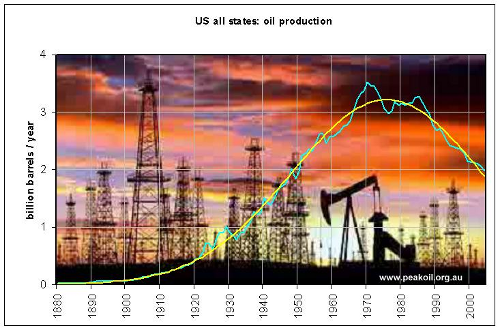The plastics used by the majority of these factories will also be more expensive. This will impact on the ability of the high-tech oil industry to maintain production. There will be less energy to keep the universities running to train the engineers to keep oil production up. At lower levels of total energy we simply will not be able to maintain the current complex economy and society that allows oil production at its current scale to occur. This is why it is extremely doubtful that there will be a gentle decline in oil production after peak oil.
Peak oil commentators commonly cite the peak of oil production in the USA as an example for what the world faces as a whole in terms of oil production. The US peak appears quite symmetrical - the rate of production increase on the way up to the peak is broadly similar to the rate of production decrease after the 1970 peak of production.

Advertisement
However, the only reason why this could occur, in the face of decreasing EROI was because the USA was able to subsidise oil production post-peak using other forms of energy. The thousands upon thousands of pumpjacks (“nodding donkey” oil pumps) that now extract the dregs of the USA’s oil inheritance are primarily powered by electricity from coal-fired and nuclear power plants. Despite its declining oil production, the USA’s population and economic activity have been able to expand since 1970 by using a larger amount of oil energy now provided by imported oil.
Today, the USA imports about two thirds of the oil energy it consumes. But after the world peak of oil production there will be no other place to import oil from. The process of oil extraction can be subsidised by coal, gas or nuclear-derived energy where access to these exists. However, the history of oil production has been a continuous journey to ever more remote and inaccessible areas to find oil. Unlike the USA, most of these areas do not have electricity “on tap”. Dmitry Orlov wrote very amusingly about the decline of oil production after the world peak in his essay, “The Slope of Dysfunction”.
To cover the costs of developing new sources of oil, the barrel price of oil must remain above US$70. However, as supply falls and economies continue to attempt to grow, oil will re-enter the economy-killing zone above $100 (where 5 per cent of world GDP is going to oil purchases. This will, once again, destroy economic activity leading to another reduction in oil demand and another collapse in the oil price to below the necessary US$70 per barrel. These gyrations in the oil price will discourage investment in new projects and contribute to a much faster drop in oil production. The happy news for motorists is that oil is unlikely ever again to reach $147/barrel (inflation adjusted). The unhappy news is that the motorists will probably be unemployed and unable to afford the oil in any case.
If our society and civilisation is to survive the challenge of declining oil (and, ultimately, declining natural gas, coal and uranium) we need to invest in renewable forms of energy and adapt to the more or less variable supply that the various renewable sources provide. (Improved battery technologies would be a huge assistance in this regard.)
However, renewables form only a tiny fraction of the world economy at present and expanding them to fill the fossil gap - while the economy is in decline, food production is disrupted and many other calls are being made on the dwindling net energy supply, will involve extreme sacrifice that the citizens of developed nations will only make unwillingly. By the time they realise the necessity there will probably be little net energy left to build the renewables infrastructure in any case.
Advertisement
Late additional note:
In an article with a related theme titled "Recovery Over a Barrel" in The Courier-Mail of November 20 and that also raises issues from my previous On Line Opinion essay Paul Syret reported the following that indicates that both the Labor and Liberal parties continue to try sweep the peak oil issue under the carpet:
It went unreported in the media this week, but on Wednesday Greens deputy leader Christine Milne noted in the Senate that: "Neither the former Howard government nor the Rudd Government implemented the first recommendation of the 2007 Senate Rural and Regional Affairs and Transport Committee report into Australia's future oil supply and alternative transport fuels.
This recommendation was that Geoscience Australia, ABARE and Treasury reassess both the official estimates of future oil supply and the "early peak" arguments and report to the government on the probabilities and risks involved, comparing early mitigation scenarios with a business-as-usual approach.
She called on the government to "develop a national plan to respond to the challenge of Peak Oil and Australia's dependence on imported foreign oil". The motion was defeated 31 votes to six.
The most basic logic should tell us we can't continue to increase the exploitation of a finite resource indefinitely.
Discuss in our Forums
See what other readers are saying about this article!
Click here to read & post comments.
6 posts so far.